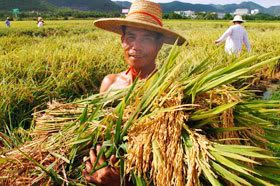New public-private hybrid rice group aims to raise rice yields in the tropics
 A new international research initiative, linking the private and public sectors for the first time and launched on November 9 at the 2007 Asian Seed Congress, aims to boost the research and development of hybrid rice for the tropics.
A new international research initiative, linking the private and public sectors for the first time and launched on November 9 at the 2007 Asian Seed Congress, aims to boost the research and development of hybrid rice for the tropics.The Hybrid Rice Research and Development Consortium (HRDC), established by the International Rice Research Institute (IRRI), will strengthen public-private sector partnership in hybrid rice, a technology that can raise the yield of rice and thus overall rice productivity and profitability in Asia.
The news is important for the bioenergy community, because one of the criteria that need to be met in order to tap the vast theoretical potential for biomass production (previous post), is increased and more efficient food production. Both processes go hand in hand. Rice is the world's most important food crop, grown on approximately 152 million hectares of land (statistics here).
Hybrid rice takes advantage of the phenomenon of hybrid vigor - known as heterosis - to achieve yields 15 to 20% higher than nonhybrid (inbred) varieties. Over the past three decades, the technology has helped China achieve food security, but has not yet reached its potential in the tropics - the place where food production can be vastly improved and where the largest bioenergy potential can be found.
National agricultural research and extension systems and other public sector organizations engaged in hybrid rice research and development will be among the primary beneficiaries of funds generated by the HRDC. Rice farmers in Asia will benefit from accelerated access to hybrid rice-based technologies such as more and better hybrids, good-quality seed, knowledge, and services provided by the private and public sectors. - Dr. Fangming Xie, IRRI senior hybrid rice researcherIRRI and its partners in the public and private sector have led research on development of, and use of, hybrid rice technology in the tropics for almost 30 years. Successful deployment of hybrid rice in Asia, however, requires more effective cooperation between public research institutions and the private sector in research to overcome current constraints.
The HRDC will be hosted by IRRI and will have three major objectives:
- Support research on developing new hybrids with enhanced yield heterosis, improved seed production, multiple resistances to stresses, and grain quality.
- Support research on best management practices for rice hybrids.
- Improve information sharing, public awareness, and capacity building.
 energy :: sustainability :: biomass :: bioenergy :: biofuels :: biotechnology :: agriculture :: rice :: tropics :: Asia ::
energy :: sustainability :: biomass :: bioenergy :: biofuels :: biotechnology :: agriculture :: rice :: tropics :: Asia :: The HRDC will have a public-private sector advisory committee and will meet annually to provide information to its members on new plant genetic resources available or under development, review research on hybrid rice management, discuss new research priorities, and make decisions on other consortium activities such as capacity building for both the public and private sectors.
According to IRRI senior hybrid rice researcher Fangming Xie, the HRDC will significantly enhance the capacity for hybrid rice research and product delivery, while providing services and support to the private sector in its product development and delivery that will benefit the general public.
References:
International Rice Research Institute: New hybrid rice group aims to raise rice yields in the tropics - November 9, 2007.
International Rice Research Institute: At Last, Tropical Hybrids - April 19, 2000.
IRRI / FAO: Adoption of Hybrid Rice in Asia - Policy Support - Proceedings of the workshop on policy support for rapid adoption of hybrid rice on large-scale production in Asia, Hanoi, Viet Nam, 22-23 May 2001, Rome 2002
Biopact: IEA report: bioenergy can meet 20 to 50% of world's future energy demand - September 12, 2007
 --------------
--------------
 Biopact's Laurens Rademakers is interviewed by Mongabay on the risks of large-scale bioenergy with carbon storage (BECS) proposals. Even though Biopact remains positive about BECS, because it offers one of the few safe systems to mitigate climate change in a drastic way, care must be take to avoid negative impacts on tropical forests.
Biopact's Laurens Rademakers is interviewed by Mongabay on the risks of large-scale bioenergy with carbon storage (BECS) proposals. Even though Biopact remains positive about BECS, because it offers one of the few safe systems to mitigate climate change in a drastic way, care must be take to avoid negative impacts on tropical forests.








0 Comments:
Post a Comment
Links to this post:
Create a Link
<< Home